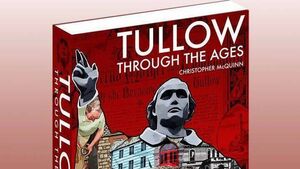Christy's new book explores the history of Tullow and its people

Christopher McQuinn's new book will be launched this Thursday
A LIFETIME of research into Tullow’s history will be unveiled this week when local historian Christopher McQuinn launches his first book, a comprehensive exploration of the town’s people and their stories spanning from the Bronze Age to modern times.
The 600-page will be launched by historian Turtle Bunbury at the Mount Wolseley Hotel this Thursday, 16 October, at 7.30pm.
Mr McQuinn, a retired teacher with a master’s degree in educational management from Trinity College Dublin, spent years compiling the work, which began not as a book but as a collection of articles for local parish magazines and historical publications.
“It didn’t actually start as a book. It started as articles mainly for local parish magazines and , historical publications. The book started about five years ago, but the basis was there for many years before that,” Mr McQuinn explained.
The book weaves together the stories of notable local figures against the backdrop of significant historical events. Among those featured are Judith Wogan-Browne, Daniel Delany, Fr John Murphy, Thomas Traynor, the Wolseley gentry and the Tullow women convicts transported to Tasmania.
A particularly poignant discovery during his research was the story of the ‘Tullow Five’ – women transported to Tasmania in 1845 for stealing potatoes during the Famine.
“They were mainly widows, single parents who were starving, and they stole potatoes to feed their children. And for that they were brought to court in Tullow, sent to prison in Carlow and up to Grangegorman in a holding place before being transported to Australia, to Tasmania,” Mr McQuinn said.
The descendants of these women went on to achieve remarkable success. One woman, Mary Burgess, has over 500 descendants in Australia. Historian Dr Diane Snowden, a descendant of the Tullow Five, has written extensively about their story and was instrumental in having a statue dedicated to them erected in Tasmania, created by Rowan Gillespie, the sculptor behind Dublin’s iconic Famine memorial.
Mr McQuinn was particularly interested in documenting Tullow’s “educational uniqueness”, highlighting how two religious orders – the Brigidines and the Patricians – were founded in the town and went on to establish schools worldwide, from Australia to Ghana.
“There are five huge successful schools in Melbourne. If you go into the foyer there, you will see a big mural of Tullow in the background,” said Mr McQuinn, who visited the schools during his research.
The hardback book, which features copious illustrations, covers topics ranging from prehistoric monuments and Rathgall stone fort (dating from 800BC) to agriculture, sport, music and the performing arts.
“You don’t have to read it from cover to cover. You can just dip in and look at a chapter of interest,” Mr McQuinn noted.
He hopes the book will help locals connect with the human stories of those who lived in Tullow before them and appreciate the town’s significant, yet underappreciated, global impact.
costs €35 and will be available after the launch in local shops and from Woodbine Books in Kilcullen, both in-store and online.




